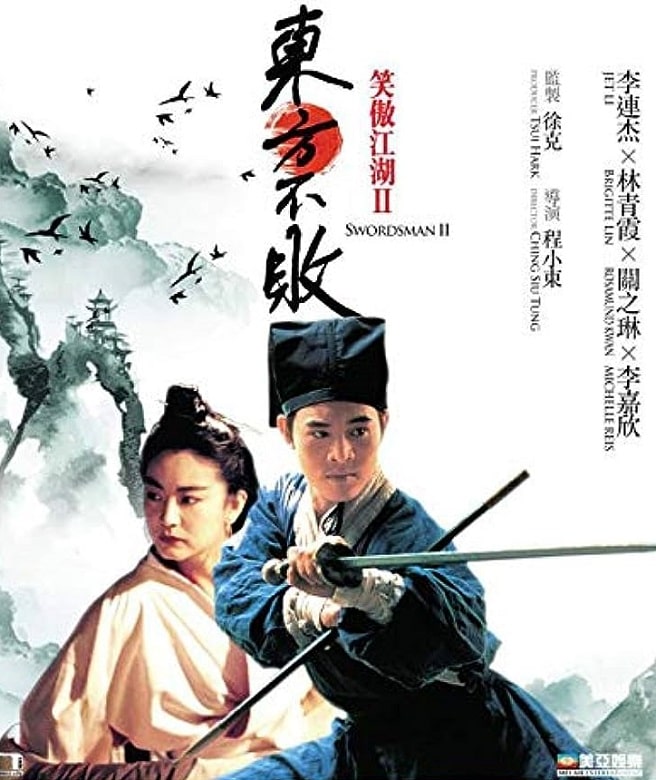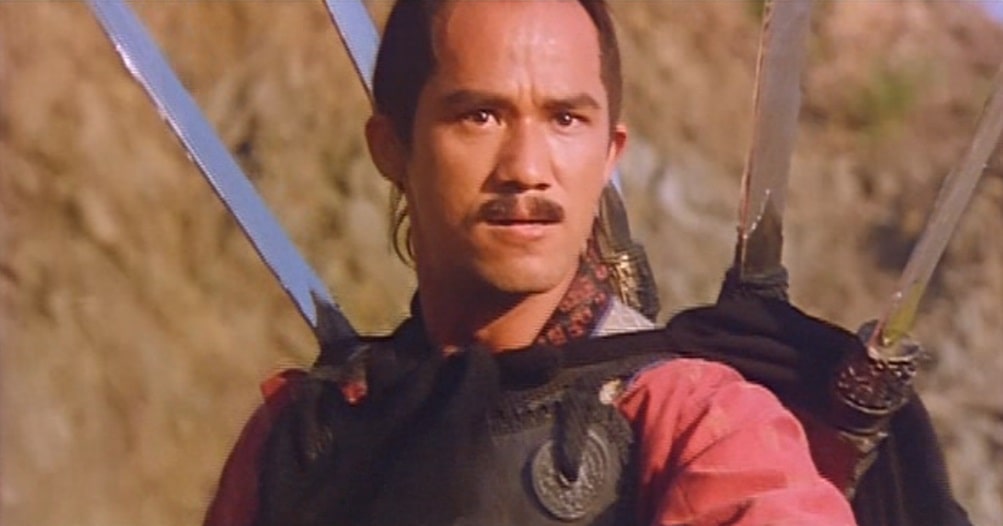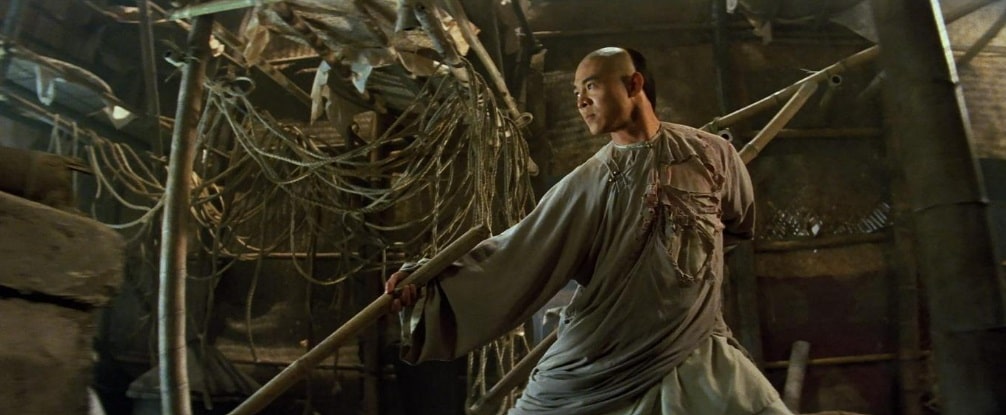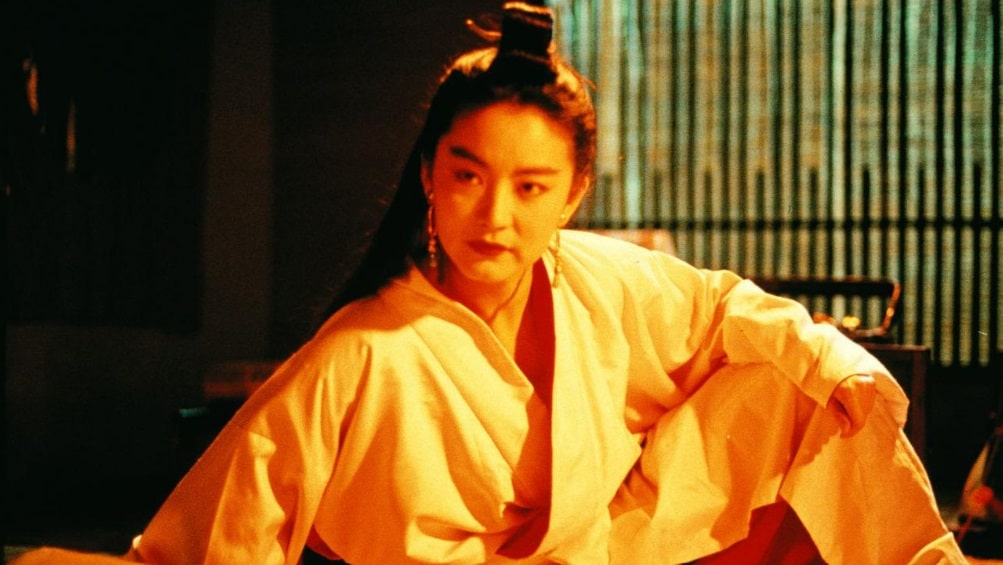Ellsworth’s Cinema of Swords: Deuces Wild
The Swordsman II (Hong Kong, 1992)
In our last Cinema of Swords article, we talked about sequels gone wrong, follow-up films to surprise hits that just went off the rails. But sometimes, at the other end of the spectrum, you get sequels done right, movies that take the strengths of the first film in a series and then build and improve on them. As an example of this, I don’t think we can do better than three wuxia films from the early ‘90s, each of which managed to incorporate the good qualities of its predecessor and then exceed them. And it’s no coincidence that all three of these films were produced by that eclectic polymath of Hong Kong cinema, Tsui Hark.
A Chinese Ghost Story II
Rating: ***
Origin: Hong Kong, 1990
Director: Ching Siu-tung
Source: Mega Star DVD
A direct sequel, this movie starts with a recap of the previous film. Longer and busier than the first installment, Ghost Story II packs in more swordplay, more magic, more monsters, and doubles the romantic leads, but for all that it barely manages to pack the emotional punch of its predecessor.
Bereft of his ghost lover, the scholar Ning (Leslie Cheung) returns to his hometown, which is now in a bad way: cannibals prey on the customers at the local inn, a dog runs by with a human hand in its mouth (a callout to Yojimbo), and Ning is falsely arrested by bounty hunters and thrown in prison. His cellmate is Elder Chu (Ku Feng), an eccentric sage, who helps Ning escape on the eve of his execution. By accidentally stealing his horse, Ning meets Autumn (Jacky Cheung), another Taoist ghost-hunter.
The pair stay overnight in an abandoned manor house where they are attacked by a gang of warriors disguised as ghosts. Two of the warriors are sisters Moon (Michelle Reis) and Windy (Joey Fong), who looks exactly like Ning’s lost ghost lover Siu-sin (and is played by the same young woman). Backed up by the warriors, the sisters are out to rescue their father, Lord Fu (Lau Siu-Ming) from imperial captors led by Five-Blade Hu (Waise Lee). The sisters mistake Ning for Elder Chu, and jealousy arises as both realize they’re attracted to him.
Then: real monsters. The ramshackle house is haunted by a toothy reptilian guy-in-a-suit demon that drools ectoplasm, there’s a three-sided fight between Autumn, Hu, and the lizard demon, but then the real Big Bad arrives in the form of a spell-casting evil high priest who assumes the false form of a glowing golden buddha. Politics and religion briefly rear their ugly heads before being eclipsed by the arrival of a giant flying centipede demon, which as you might imagine changes the conversation somewhat, and Ning has to recruit his old phony-bearded pal Swordsman Yin (Wu Ma) to help sort things out. Ectoplasmic slime is deployed by the gallon, sacrifices are made, and at least one of the romantic couples gets a happy ending. A trifle overlong and muddled, but nonstop fun nonetheless.
Once Upon a Time in China II
Rating: ****
Origin: Hong Kong, 1992
Director: Tsui Hark
Source: Eureka! Blu-ray
The first film in the series was set in Foshan at an indeterminate time in the late 19th century, but this sequel definitely takes place in the late 1890s, after China’s humiliation in the First Sino-Japanese War. Wong Fei-hun (Jet Li), doctor, martial artist, and culture hero, travels to Canton, the regional capital, for an international medical conference, taking with him his sidekick Foon (Max Mok) and 13th Aunt (Rosmund Kwan), Wong’s interpreter with Western languages and shy romantic interest. As in the previous movie, the arrogance and territorial ambitions of European “foreign devils” are causing unrest in the coastal provinces, and resistance movements are popping up to oppose them.
The most violent and fanatical agitators, introduced in the opening sequence, are members of the White Lotus cult, which combines aspects of the historical White Lotus Society and the movement Western historians refer to as the Boxers. This cult believes that adorning themselves with holy prayers gives them magical protection against firearms and cannon, which will enable them to drive out the foreigners using traditional armed martial arts, as demonstrated by their fierce leader, Grandmaster Gau Gung (Hung Yan-yan).
Other factions are actively intriguing as well: the much-weakened Imperial Court, whose local forces are led by the domineering Commander Lan (Donnie Yen), and a republican movement who want to bring democracy to China, led by Sun Wen (Zhang Tielin) in a role based on the historical Sun Yat-sen. Wong is once again the calm center standing outside faction politics, desiring only peace, protection of the innocent, and advances in medicine — but his fame is such that he keeps getting pulled into dangerous conflicts, and his devotion to justice draws him into fighting on the side of the weak and exploited. Wong tries to reach a rapprochement with Lan, but the court’s complicity with the outrages of the White Lotus zealots pushes him toward the faction of the moderate and honorable republicans.
China II is as visually striking as its predecessor, its protagonists as likeable as ever — and its story just as complicated. The slapstick comedy is dialed down a bit, and the martial arts combat, choreographed by fight director Woo-ping Yuen (Crouching Tiger, Hidden Dragon), seems restrained compared to the first film — until we get to the climax, when Wong fights two jaw-dropping-incredible boss battles in sequence against faction leaders Gau Gung and Commander Lan. Wowzers. It’s no wonder this sequel was even more successful at the box office than the first installment.
The Swordsman II (or The Legend of the Swordsman)
Rating: *****
Origin: Hong Kong, 1992
Directors: Ching Siu-tung
Source: Optimum Asia DVD
The first Swordsman film (1990) was kind of a disorganized mess, but it was agreeable and entertaining, and most importantly it was a success, so producer Tsui Hark raised the ante for the sequel: production values are visibly improved, and nearly all the actors of the first film have been replaced by higher-profile stars. Jet Li gets top billing, but this film belongs to Brigitte Lin in possibly her best and most striking performance, playing a man who chooses to become a woman in a film that asks what gender is about, really, and why does it matter so much?
You know, in the context of kickass wuxia martial arts action.
As before, endearingly feckless wandering martial artists of the Wah Mountain clan Ling (Jet Li) and his female-disguised-as-male sidekick and would-be romantic interest Kiddo (Michelle Reis) get caught between three battling factions, and events quickly escalate from merely lethal to catastrophic. The factions this time are the “mainland” imperial court, a force of rebel samurai and ninja exiled from Japan, and the return of the “highland” Sun Moon Sect, grown powerful under the leadership of their ambitious new chief, Invincible Dawn (Brigitte Lin). The sect’s Master Wu (Yen Shi-kwan) has been deposed by Dawn, and Ling and Kiddo’s friends, Wu’s daughter Ying (Rosamund Kwan) and Blue Phoenix of the serpent-shooting sleeves (Fennie Yuen), have been forced to swear fealty to their new leader.
Invincible Dawn has mystic powers drawn from a Sacred Volume that she’s able to wield only because she’s changed gender from male to female, and though she still leads the sect in male garb, she increasingly embraces her new femininity. It’s as a woman that Ling encounters her without knowing who she is, in a deliriously romantic episode in which Ling flies Dawn through the nighttime forest to a hill where they watch the moon rise, Dawn never speaking, just smiling and playing a mournful tune on a flute.
But the main recurring tune is the catchy “Heroes Song” from the first film, which Ying plays while waiting for Ling to return to her from his wanderings, and which the other Wah Mountain clan fighters sing after they’re reunited with Ling and Kiddo at the lonely forest inn where the factions meet and clash. As a favor to Ying, Ling manages to find her father Wu and release him from Dawn’s torture dungeon in a fun sequence that involves taming rats, but then the fun’s over because Dawn’s cruelties have transformed Wu into a murderous psycho bound on vengeance.
Bloody wuxia mayhem follows, the various bosses all using their signature moves while helpfully shouting their names, calling out “dragon in the sky!” or “the wavering sword!” as they strike. This is a full-on fantasy, with characters flying around like superheroes and casting mighty sword spells, shattering cliff faces and collapsing castles — but what’s really important is, who does Ling really love, Ying, Dawn, or Kiddo? Hong Kong wuxia doesn’t get much better than this.
Where can I watch these movies? I’m glad you asked! Many movies and TV shows are available on disk in DVD or Blu-ray formats, but nowadays we live in a new world of streaming services, more every month it seems. However, it can be hard to find what content will stream in your location, since the market is evolving and global services are a patchwork quilt of rights and availability. I recommend JustWatch.com, a search engine that scans streaming services to find the title of your choice. Give it a try. And if you have a better alternative, let us know.
Previous installments in the Cinema of Swords include:
For the Horde!
The Princess Bride Redeems the 80s
Samurai Stocking Stuffers
Moonraker! (No, Not That One)
Cinema of Swords Book Announcement!
Fury of the Norsemen
Samurai With a Twist
The Barbarian Boom, Part 7
Avenging Women
Mondo Mifune
Near Misses in the Near East
Banditti!
Zatoichi at Large
Invitation to a Keelhauling
Sequel Debacle
LAWRENCE ELLSWORTH is busily promoting the Cinema of Swords compilation from Applause Books that was born right here at Black Gate! The volume out now covers swordplay movies up through the ‘80s, but Ellsworth is continuing with new material for a Volume Two and is now working his way up through the 1990s. These later reviews are being published weekly on his new Cinema of Swords Substack blog, at cinemaofswords.substack.com
Meanwhile, Ellsworth soldiers on in his mega-project of editing and translating new, contemporary English editions of all the works in Alexandre Dumas’s Musketeers Cycle; the sixth volume, Court of Daggers, is available now as an ebook or trade paperback from Amazon, while the seventh, Devil’s Dance, is being published in weekly installments at musketeerscycle.substack.com. His website is swashbucklingadventure.net. Check them out!
(Ellsworth’s secret identity is game designer LAWRENCE SCHICK, who’s been designing role-playing games since the 1970s. He now lives in Dublin, Ireland, and is Principal Narrative Designer for the Dungeons & Dragons videogame Baldur’s Gate 3.)




Great choices, Mr. Ellsworth! Once I saw what your topic was, I immediately thought that Swordsman 2 would show up. I’ve always thought that Ching Siu-tung was probably the best action and stunt director during Hong Kong’s fantastic 80’s and 90’s heyday with so many incredible films he was involved with. You surprised me with your other choices of ACGS 2 and OUTIC 2, as they don’t readily spring to my mind as sword films, but you’ve got me excited to go rewatch them to enjoy them again!
I love all of these movies!
Another Ellsworth’s Cinema of Swords??? Fantastic, not to mention Incredibly Confusing!
I haven’t seen any of these films but your synopsis is so bewildering that I’ve just got to watch them all at least once! Thanks for finding films like this when I never knew they even existed.